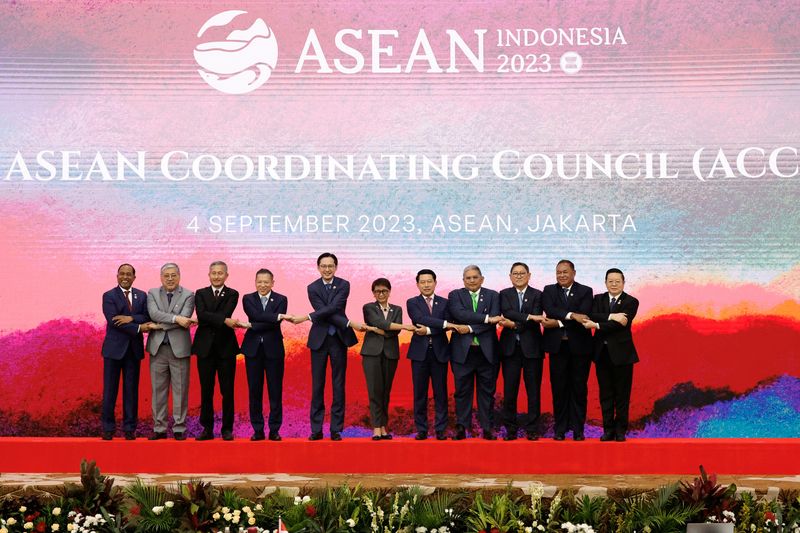ASEAN leaders seek to assert bloc’s relevance at annual summit
2023.09.04 18:49
5/5

© Reuters. Malaysia’s Foreign Minister Zambry Abdul Kadir, Philippines’ Foreign Secretary Enrique Manalo, Singapore’s Foreign Minister Vivian Balakrishnan, Thailand’s Permanent Secretary of the Ministry of Foreign Affairs Sarun Charoensuwan, Vietnam’s Deputy Foreign
2/5
By Kate Lamb
JAKARTA (Reuters) – Southeast Asian leaders will on Tuesday converge on the Indonesian capital for an annual summit amid rifts within the 10-member regional bloc over stalled peace efforts in Myanmar and a sharpening U.S.-China rivalry in the region.
The Association of Southeast Asian Nations (ASEAN) is seeking to clarify its relevance as cracks emerge in its response to the conflict in Myanmar, where the military seized power in a bloody coup in 2021.
“The eyes of our peoples are on us to prove ASEAN still matters and can contribute towards peace, stability and prosperity in the region,” Foreign Minister Retno Marsudi of chair Indonesia said on Monday.
Leaders will review an ASEAN peace plan that calls for a cessation of hostilities and inclusive dialogue to resolve the crisis in Myanmar, which, two years in, shows no sign of de-escalating.
A lack of progress has increased frustration and exposed internal divisions in a bloc that prioritises unity and non-interference in members’ sovereign affairs.
Indonesia has attempted to engage all stakeholders in Myanmar, but unilateral moves by Thailand to include the country’s shunned military leaders, who are banned from attending high-level ASEAN meetings, have dented the bloc’s credibility and led to division among member states.
Former Indonesian foreign minister, Marty Natalegawa, said the bloc must adapt to today’s challenges or risk oblivion.
“Obituaries on ASEAN actually have been written many times over, but somehow all those times, ASEAN has been able to reinvent itself and reassert its relevance. I feel today we are at one of those junctures,” he said on Monday.
The final ASEAN summit this year also comes days after China released a “10-dash line” map, which lays claim to a larger portion of the South China Sea (NYSE:) and will likely add pressure to negotiations with China on a long-delayed code of conduct in the strategic waterway.
ASEAN member states Malaysia, Vietnam and the Philippines, which have overlapping claims in the South China Sea, have rejected the map.
Later this week, chair Indonesia will also host the East Asia summit, a wider forum that includes China, India, Japan, Russia and the United States, but that will be marked by the conspicuous absence of U.S. President Joe Biden. Vice President Kamala Harris will attend in his stead and Chinese Premier Li Qiang will also attend.








